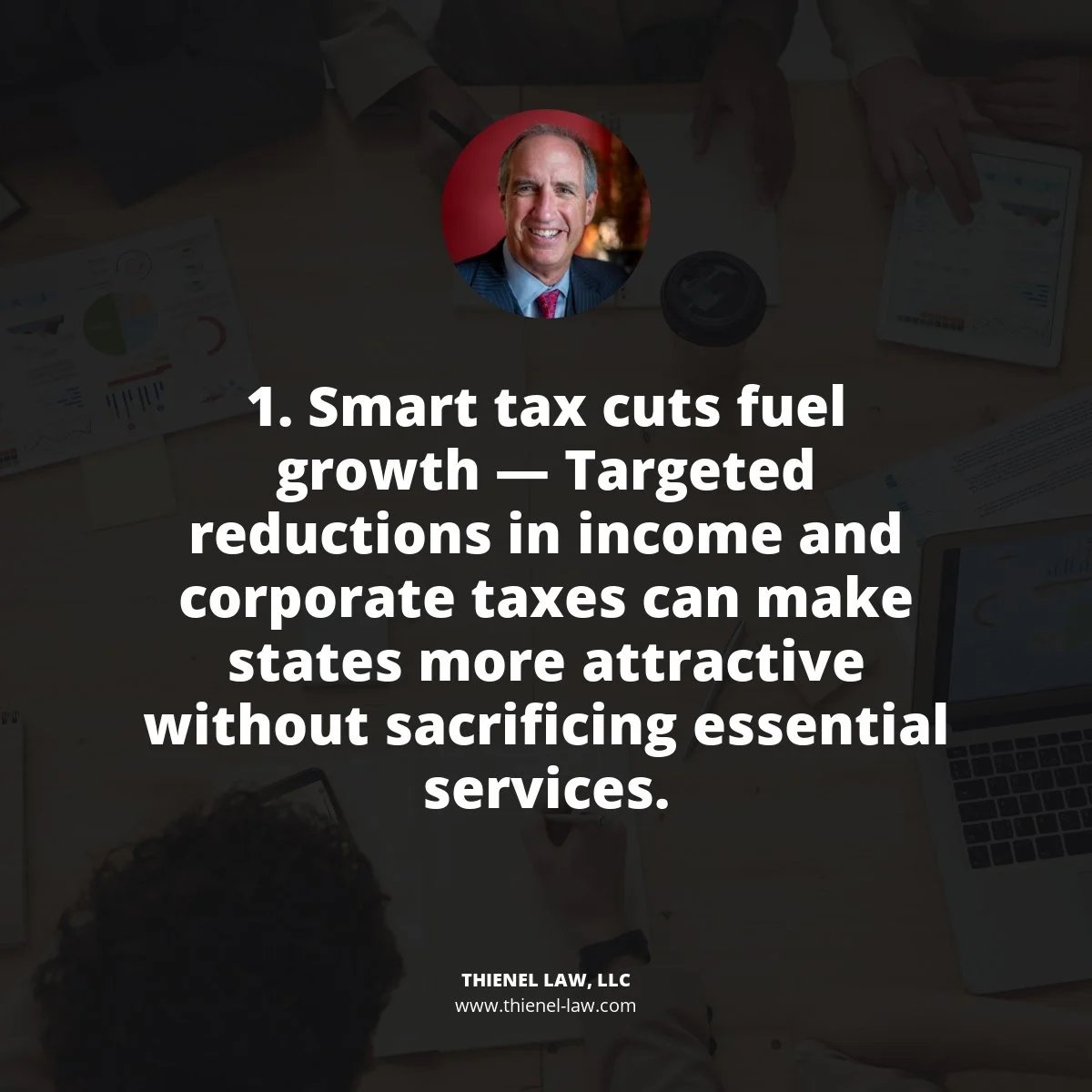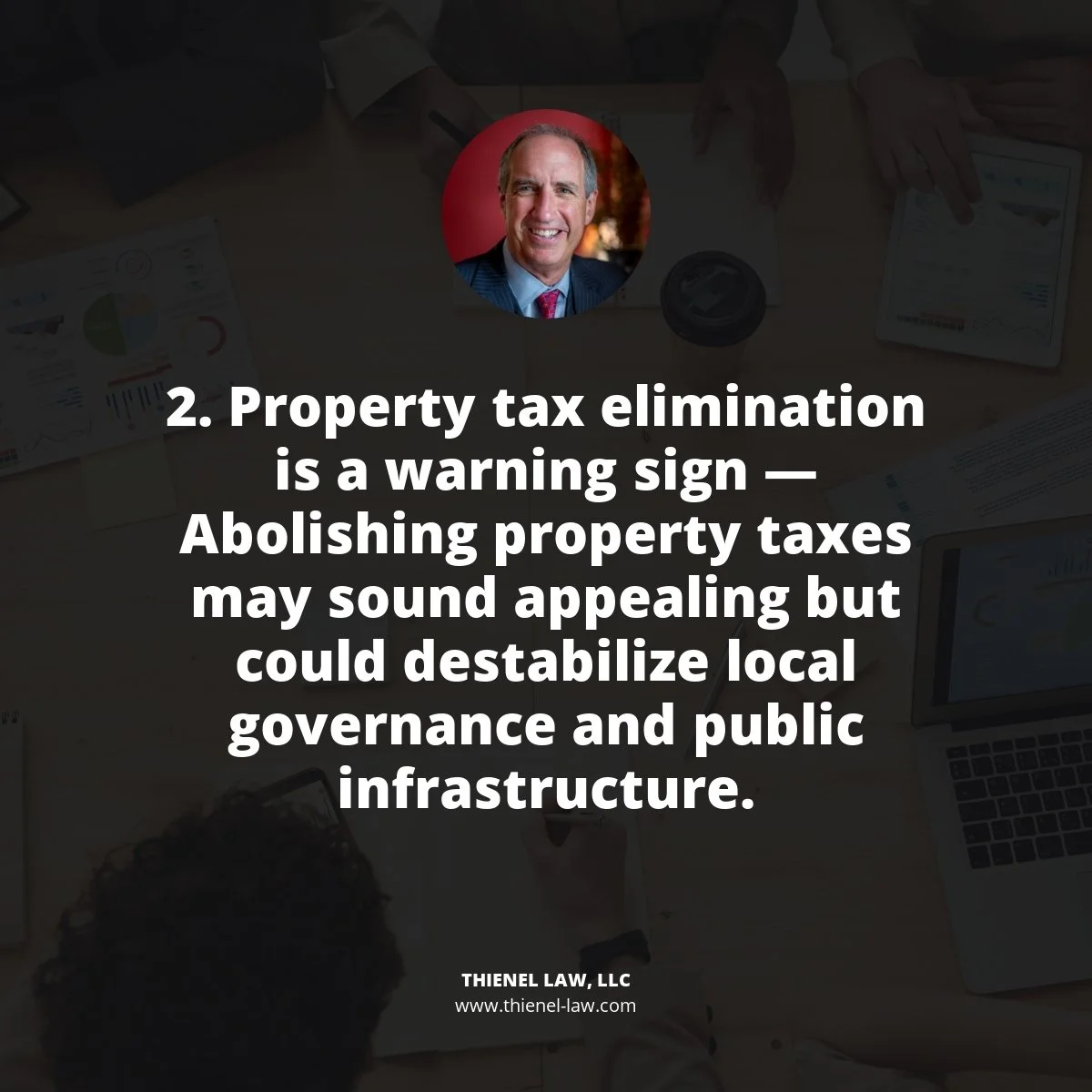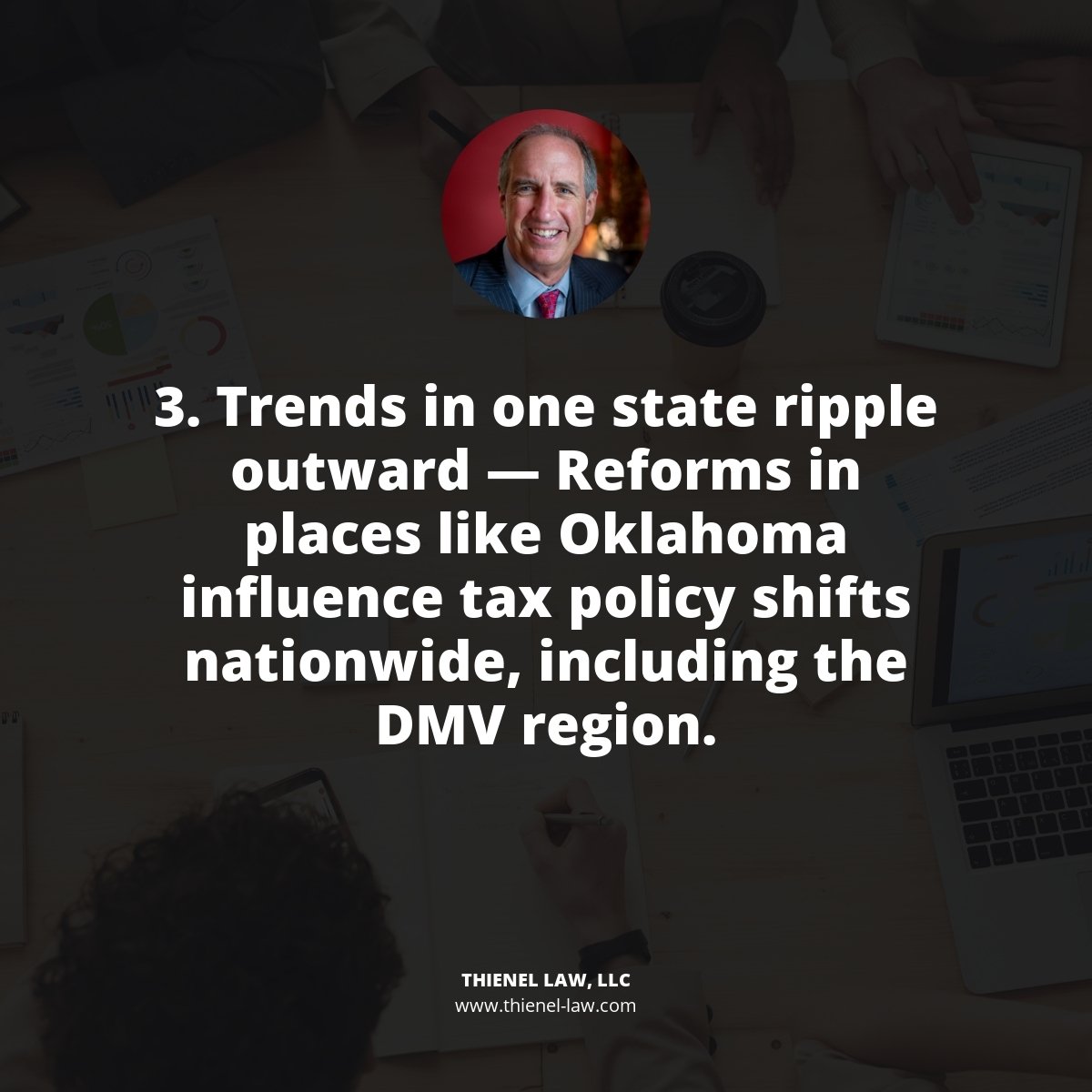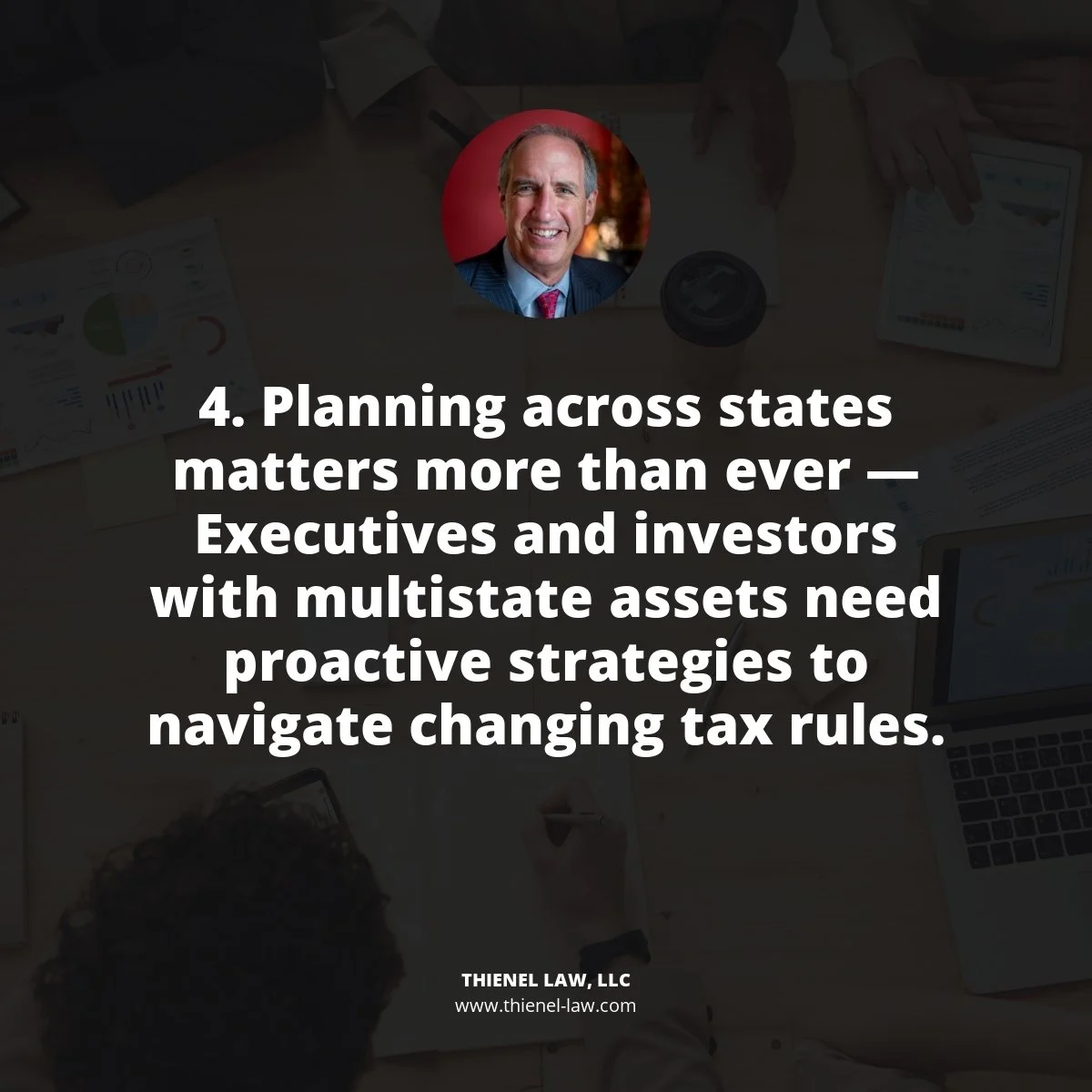Boosting Oklahoma's Competitiveness: Smart Tax Reforms Without Risky Property Tax Elimination
Key Takeaways:
A modern, competitive tax structure can attract businesses and skilled professionals—but striking the right balance between revenue needs and pro-growth policies is essential.
Lowering individual and corporate income tax rates in a targeted way can create economic growth without undermining essential public services.
Eliminating property taxes altogether, as some propose in Oklahoma, could have unintended and harmful consequences for local governments and long-term fiscal stability.
For business owners, professionals, and high-net-worth individuals, understanding trends in state tax reform can guide long-term planning, especially when weighing relocation, expansion, or asset protection strategies.
Maryland, Virginia, and D.C. can draw lessons from other states' tax reforms while avoiding pitfalls that could destabilize their own tax bases.
What Oklahoma's Tax Reform Debate Means for Business Owners in Maryland, D.C., and Virginia
The national conversation around tax policy is shifting. States are re-evaluating their tax systems to compete for top businesses, talent, and investment. Oklahoma is the latest example, considering reforms to corporate and individual income taxes. But some proposals, like eliminating property taxes altogether, raise red flags.
You might wonder—how does a debate in Oklahoma affect me if I'm operating a business or managing wealth here in the Washington, D.C. metro area?
Here's what's important: state tax trends are contagious.
What sets a precedent in one region can influence policy menus in others. For high-net-worth individuals, business owners, and professionals in the DMV, keeping an eye on how other states adjust their tax strategies can help you stay ahead, whether it's for relocation planning, investment structuring, or risk management.
Here's what you need to know.
Why Tax Structure Matters — and What Oklahoma Is Proposing
Oklahoma lawmakers are exploring ways to increase the state's economic competitiveness. That's not unusual. States often look to attract new residents, businesses, and development by adjusting their tax landscapes.
Proposals include:
Reducing personal income tax rates
Cutting corporate income taxes
Dramatically reducing—and in some versions—eliminating property taxes
Cutting income taxes can make the state more attractive to entrepreneurs, retirees, and mobile professionals. Corporate tax reform could lure businesses looking to relocate or expand operations.
But eliminating property taxes entirely? That's where the strategy turns risky.
Property taxes are a major source of local funding. Schools, first responders, and infrastructure rely on them. Replacing that revenue responsibly would require either a steep increase in sales or income taxes—or cutting public services.
The bottom line: not all tax cuts are created equal.
A Balancing Act: Growth vs. Stability
For states like Maryland, Virginia, and D.C., reforming tax policy requires balance: creating a pro-growth environment without gutting essential government functions.
When done strategically, modest reductions in income and corporate taxes—paired with a broad, stable tax base—can improve competitiveness. Business owners benefit from lower marginal rates. Professionals and retirees enjoy more favorable conditions. And the state economy grows.
But when states veer too far—such as proposing full elimination of property taxes—they risk fiscal instability. Over-reliance on one or two revenue streams leads to higher volatility, lower credit ratings, and inconsistent funding of public services.
For instance, if Oklahoma shifts heavily toward income taxes to replace lost property tax revenue, that system becomes more volatile during downturns. Sales taxes alone can't cover the loss without being regressive for lower-income residents.
DMV residents should consider how balanced their own tax environments are when making estate and business planning decisions.
What This Means for DMV-Based Businesses
Even though Oklahoma's tax changes may seem far removed from your operations, they're part of a national pattern. States are competing harder than ever for business presence, remote workers, and high-income earners.
That competition might eventually influence tax policy here at home.
For example:
Maryland's top individual income tax rate is in the upper range of state income taxes in the country. Neighboring states could respond to competitive pressure by adjusting their rates.
Local business leaders expanding across state lines may find tax arbitrage opportunities by relocating or creating pass-through entities in lower-tax states.
Federal tax reform in prior years has already increased the importance of state and local tax (SALT) planning. That trend continues as state disparities grow.
Understanding tax trends and potential reforms is especially valuable when your business operates across jurisdictions. For LLCs and S-Corps, income flows directly to owners, so changes in state rates impact take-home profits. Savvy tax planning—including where and how to domicile—can have long-term repercussions.
The Property Tax Question: Why Total Elimination Is Risky
Property taxes may be unpopular, but they play a critical role in local governance.
Let's break this down.
In Oklahoma, the idea is to use state funds to "backfill" local budgets currently funded by property taxes. Even assuming that's legally permissible and politically viable, there are serious issues:
Centralizes budget authority at the state level, weakening local control
Introduces unpredictability, since local governments won't directly control their funding base
Forces the state to increase other taxes (like sales or income) to create the backfill funds
For context, most local public school systems are primarily funded by property taxes. In the DMV, this principle holds true. Eliminating this stable and localized funding source would create chaos for school boards and city planners.
Here's the cautionary tale: even if other states aren't proposing this today, tax experiments in one part of the country often inspire similar pushes elsewhere.
What seems like a cost-saving measure on the surface can pose real limitations for service delivery. These changes have effects on business investment, property values, and long-term infrastructure development.
Estate Planning and Property Ownership Considerations
For high-net-worth individuals in the DMV, especially those holding real estate or business interests in multi-state portfolios, it's crucial to monitor how property taxes trend across jurisdictions.
If property tax burdens rise in one state but fall in another, strategic relocation or restructuring might be worth exploring.
On the other hand, if states like Oklahoma remove property taxes and replace them with higher individual income taxes, those with significant non-wage income might see higher annual tax bills—even if they don't own real estate directly.
Estate planning strategies—like setting up trusts, creating family partnerships, or gifting properties—should always account for the tax landscape of each jurisdiction involved.
Clients with rental properties in multiple states should evaluate whether those assets remain cash-flow positive after local tax changes. Shifting markets and tax rates could tip the balance.
Legal Considerations: Compliance, Risk, and Operations Across States
If you or your business maintains any operational footprint across state lines, make sure your growth strategy accounts for evolving state tax landscapes.
Compliance risk increases when tax rules change rapidly. For example:
A business with remote workers in Oklahoma might face new registration or withholding requirements if income taxes change.
Shifting exemptions or deductions in state law could affect how your LLC's K-1s are taxed in Maryland versus another state.
Heightened audits could occur as states seek to recapture lost revenue from prior tax cuts.
That's why real-time monitoring and annual planning are so important. A business paying six-figure annual taxes shouldn't wait until year-end to assess exposure.
Every major tax shift includes a ripple effect—from withholding to reporting to dispute resolution. That's where a qualified attorney becomes a key part of your business team.
Lessons From Oklahoma: Caution, Creativity, and Context
Oklahoma is trying to walk a difficult line: grow the economy while reducing the tax burden. There's nothing inherently wrong with that goal. But policies like total elimination of property taxes may do more harm than good.
Maryland, Virginia, and D.C. policymakers generally recognize this—prioritizing stability over dramatic overhauls. But that doesn't mean individual and business taxpayers shouldn't pay close attention.
Tax competition is real. Your choice of where to live, invest, or operate can have major implications not just today, but decades down the road.
If you're planning a business expansion, moving operations to another state, or restructuring your assets, incorporating state tax policy trends into the legal strategy is no longer optional—it's essential.
Next Steps: Get Guidance That Fits Your Goals
Navigating multi-state tax issues isn't just about understanding rates and forms. It's about seeing the full picture—compliance, asset protection, long-term planning, and practical impact.
If you're unsure how changes in state tax policy—either in your home state or others—could affect your business or personal growth strategy, we're here to help.
Schedule a consultation with Steve Thienel to explore your options. Whether you're managing a growing business, building a real estate portfolio, or preparing for succession, tailored legal advice makes all the difference.






